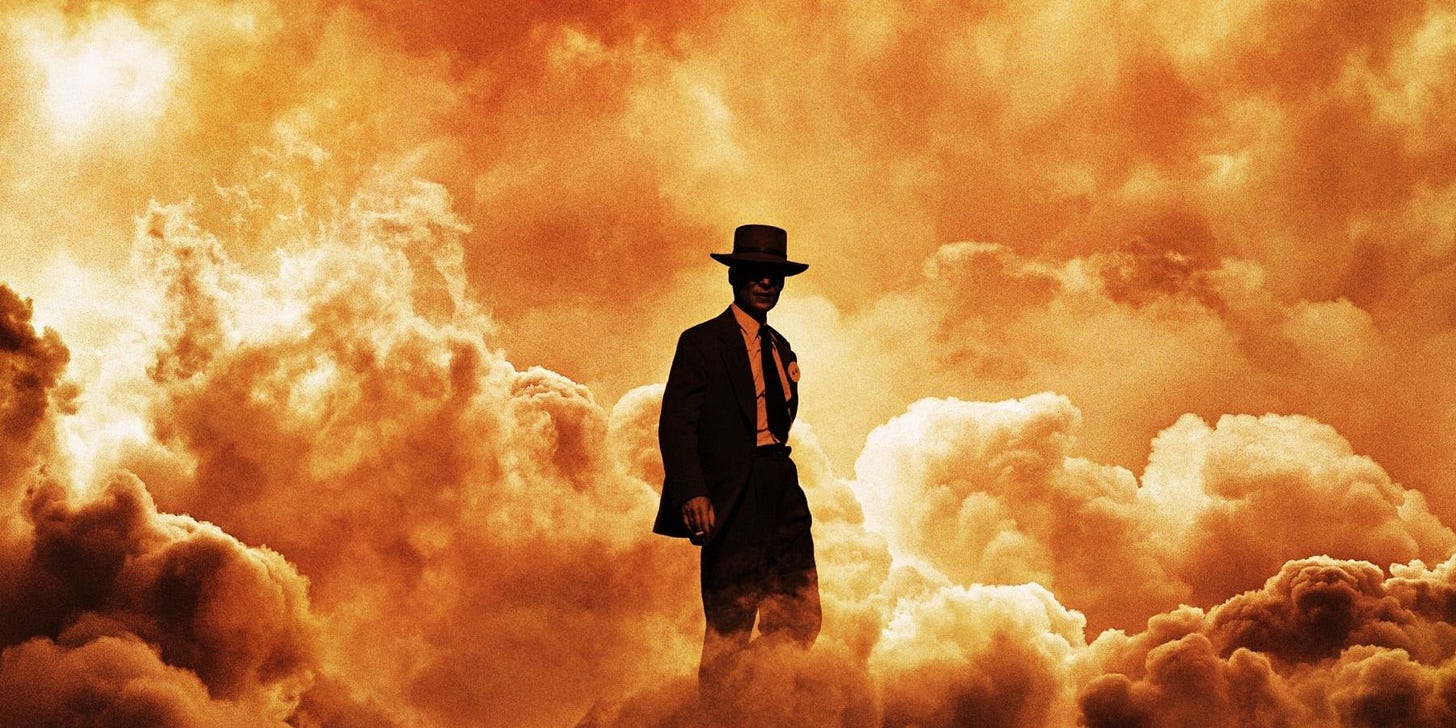Barbie
Directed by Greta Gerwig (2023) United States
and
Oppenheimer
Directed by Christopher Nolan (2023) United States
If you managed to survive our second podcast you will have heard our special guest opining on the eccentric nature of many of the films from Season One (at 37m 35s) and making a request for some more popcorn cinema. Ever ready to respond to our audience we dispatched one of ReidsonFilm to watch the big movie matchup of the summer.
I would like to begin with some important disclaimers, laying my biases on the table as best I can. While I did actually enjoy both of these movies to varying degrees, the two directors in question are by no means favourites of mine. While this originally put me off seeing either film, the Barbenheimer buzz was simply too much, the memes too strong. I had to see them both.
Let's start with Christopher Nolan: I get that he’s supposed to be the ‘Master’ of epic cinema, but increasingly Nolan is suffering from what I like to call Tarantino Syndrome - some nice ideas/techniques in his earlier films, but with all the money and power that comes with being a Hollywood titan and no one to tell him, ‘No Chris’ or, ‘Chris, three and a half hours is way too long’, his films have fallen off in recent years. They are too long, self-indulgent, riddled with plot holes, bad exposition and increasingly bad European accents from Kenneth Branagh.
I have less of an axe to grind with Greta Gerwig’s output (partly because I have seen less of it). Little Women was a great adaptation and Ladybird, I’m told, was deserving of the widespread acclaim it received. My gripe with Gerwig comes primarily from her role alongside Noah Baumbach as the New York/Hollywood “auteur” power couple. They style themselves as disciples of Woody Allen, strolling between cafes in the West Village, writing screenplays and chuckling at each other’s literary references. In the interview rounds for Barbie, Gerwig repeatedly refers to Baumbach as “my partner in life and in art”. Yuck.
With that diatribe out of the way, let’s dive into Barbie. First and foremost, the film was…quite funny. It sets out its intentions in the opening sequence with a 2001: A Space Odyssey parody before introducing us to Barbieland, where Barbie’s various iterations including doctor, lawyer and black-president Barbie are living their best lives, inspiring and empowering their real world female counterparts (or so they think). We immediately get a sense of where Gerwig is taking the film. It's fantasy, it's comedy, it's irreverent, it's fun. Margot Robbie leads the charge here playing the lead, ‘Stereotypical Barbie’, with an appropriately caricatured expressiveness and zeal.
Admittedly some of the gendered jokes are a little on the nose - quite literally in fact when, upon her arrival in the real world, Barbie has her bum slapped by a frat boy who she immediately punches square in the face. This follows a series of other misogynistic affronts to Barbie’s glamorous arrival in Los Angeles where she travels to uncover the source of the recent upsets that have occurred in Barbie Land (which include flat feet and cellulite). There are some great jokes about Ken (unless you are a fragile, male twitter-user), played by Ryan Gosling, who discovers the Patriarchy in the real world as he accompanies Barbie on her quest.
Ken delights in seeing a world of fist-bumping, weight-pumping and other forms of male affirmation, concluding that the real world is great because it’s run by ‘Men and Horses’, not a Barbie Land but a “Kendom”. Gerwig uses the ‘real world’ and ‘Barbie Land’ as two gendered extremes, each one acting as a lens through which to satirise the other, and it proves to be effective both in generating some laughs and making some subtle, and occasionally not so subtle points about gender politics. Yes, it’s a little “Feminism 101” at times, but in the era of Andrew Tate and TikTok ‘Tradwives’ maybe back to basics is what we need.
Let’s talk about Oppenheimer, and it must be said that after watching Barbie, it would be remiss not to mention the severe lack of female characters in the film. Elucidating Gerwig’s critique of the real world, we are very firmly in the Kendom of Christopher Nolan’s Oppenheimer, where women are reduced to being either housewives or sex objects. This is made particularly inexcusable, as many commentators have pointed out, by the fact that the two key female figures that do make the cut (which, by the way, fails the Bechdel test with flying colours), were both scientists in their own right. Kitty Oppenheimer was a biologist who actually worked at Los Alamos, conducting blood tests to assess the dangers of radiation - in Oppenheimer she is typically found either getting drunk or washing the bedsheets. Jean Tatlock, Oppenheimer’s lover, was a trained psychiatrist - but nonetheless spends half the film naked, at one point making Oppenheimer recite a passage from the Bhagavad Gita during a sex scene. There were a number of other women who played significant roles in the Manhattan project, but again, they were totally overlooked by Nolan.
There were, however, some spectacular moments in Oppenheimer which exceeded Nolan’s regular output. The film weaves in some very visceral ‘Physics’ sequences as Oppenheimer works away at a chalkboard or tosses and turns in his Cambridge dorm room. The sound and visual effects are hair raising, conveying the excitement and power of this newly discovered quantum world. For a Nolan film, these moments feel almost experimental, a return to his Memento era. The film maintains a good pace in the build up to the inevitable Trinity test where the atomic bomb is first detonated. Here, Nolan is back in his comfort zone of big set pieces and brooding atmosphere. It’s a very well executed scene, bringing a delicate balance of scientific accuracy and epic cinema. Similar to Barbie’s Margot Robbie, Cillian Murphy is essential in making Oppenheimer a believable and immersive biopic.
The film’s last hour or so spirals into a sort of backroom-courtroom drama, where Lewis Strauss a.k.a evil Tony Stark (Robert Downey Jr.) tries to stitch up Oppenheimer as a communist-sympathising enemy of the state. It’s not bad, but it isn’t particularly exciting, apart from the occasional PTSD moments of Oppenheimer imagining the screams of the victims in Hiroshima and Nagasaki. Frankly, it felt like Nolan ran out of steam here, cast adrift after the big climactic moment halfway through the film. He misses an opportunity to conclude the film with some provocative questions or fresh perspective on the well-trodden moral quandaries of nuclear armament. For instance, the self-destructive potential of human technology obviously has resonance with the current climate emergency and concerns about artificial intelligence - but this never really comes up, apart from Oppenheimer’s tacked-on vision of the atmosphere igniting at the very end of the film.
A number of other interesting ideas were alluded to in the film but ultimately passed over - giving back the now irradiated New Mexico land to ‘the Indians’, or the tension between reality as we know it and the world of quantum paradox - a concept we rarely get to see explored in cinema. Some of the most compelling ideas in Oppenheimer are reduced to throwaway remarks by supporting characters, which ultimately leaves very little to think about when the credits roll.
The same cannot be said for Barbie. While the central thesis of the film is confused, and somewhat lost among the glitz and glamour, Barbie at least confronts us with interesting questions. It presents the state of play in gender politics, the problems of male or female supremacy and the attempts to liberate ourselves from them with varying degrees of success. Its most salient point is in its exposure of the contradictions that define our very human compulsion to fit everything into boxes. To borrow a line from The Last Black Man in San Francisco: “People aren’t one thing”. Barbies and Kens aren’t one thing and we shouldn’t put them in boxes, metaphorical or otherwise. The film falters at the last hurdle with a cop-out answer, essentially claiming that we get to define what we are. Rather than accepting the contradictions, we can somehow overcome them by defining our own identity as we see fit. In truth, identity is always complicated, fractured and incomplete - but perhaps this isn’t the best message for a film made at least in part for children?
Questions of identity and contradiction are almost totally lost in Oppenheimer, the “big questions” feel like a high school introduction to ethics, where Nolan draws up the pros and cons on the whiteboard for us to discuss amongst ourselves. The scenes between Oppenheimer and Einstein (Tom Conti) would have been a good opportunity to explore some of these ideas in more depth, but instead they are used to resolve a gimmicky flashback and let Oppenheimer make a general point about “setting off a chain reaction that will, one day, destroy the world”.
So whilst Barbie does end up being the more thought-provoking film, sadly this is couched in two hours of consumerist fanfare. Yes, the film is lightly ribbing the Mattel Corporation for their chequered past. But let's be clear, in the age of postmodern advertising where a little self-deprecation goes a long way, ultimately the Barbie franchise will soon be skyrocketing, all thanks to a technique illustrated perfectly by this Domino’s pizza promo: The true story of how Domino's listened to its harshest critics and made their best pizza ever’.
With Barbie we are witnessing Mattel’s attempt to offer up some sliver of humility for its past indiscretions, in exchange for another decade or two of profits and a Mattel Cinematic Universe reportedly already on the way. This repackaging of damning critique into a brand new iteration of the product is a bleak prospect that Gerwig seems to have overlooked, and no amount of references to “Proust Barbie” or Ken mansplaining the significance of architecture in The Godfather can atone for this. Barbie is also laden with Chanel products (unsurprisingly, Margot Robbie is their brand ambassador) and frankly, this blend of ‘auteur’ filmmaking and ironic but also definitely not ironic product placement does leave a bad taste in the mouth. This is the future of cinema that has already arrived, an ironic engagement with ideology that is engagement nonetheless. To quote Slavoj Zizek, “Cynical distance is just one way to blind ourselves to the structural power of ideological fantasy: even if we do not take things seriously, even if we keep an ironical distance, we are still doing them.”
So, a Chanel Advert that makes you think, or a three hour Wikipedia article with some cool noises? Unfortunately, like Barbie, you have no choice - your memetic overlords have dictated that you see both, and enjoy them.
Reids Results (out of 100)
Barbie
C - 68
Oppenheimer
C - 65
Thank you for reading Reids on Film. If you enjoyed our review please share with a friend and do leave a comment. Next week, Season Two begins…
Coming next … Joyland (1950)







